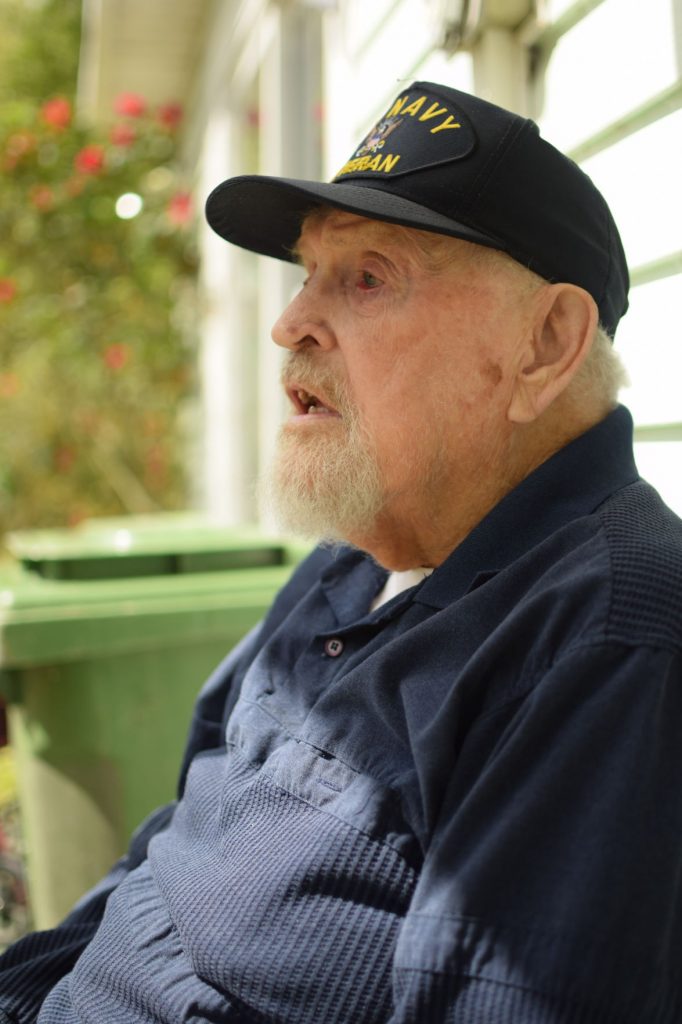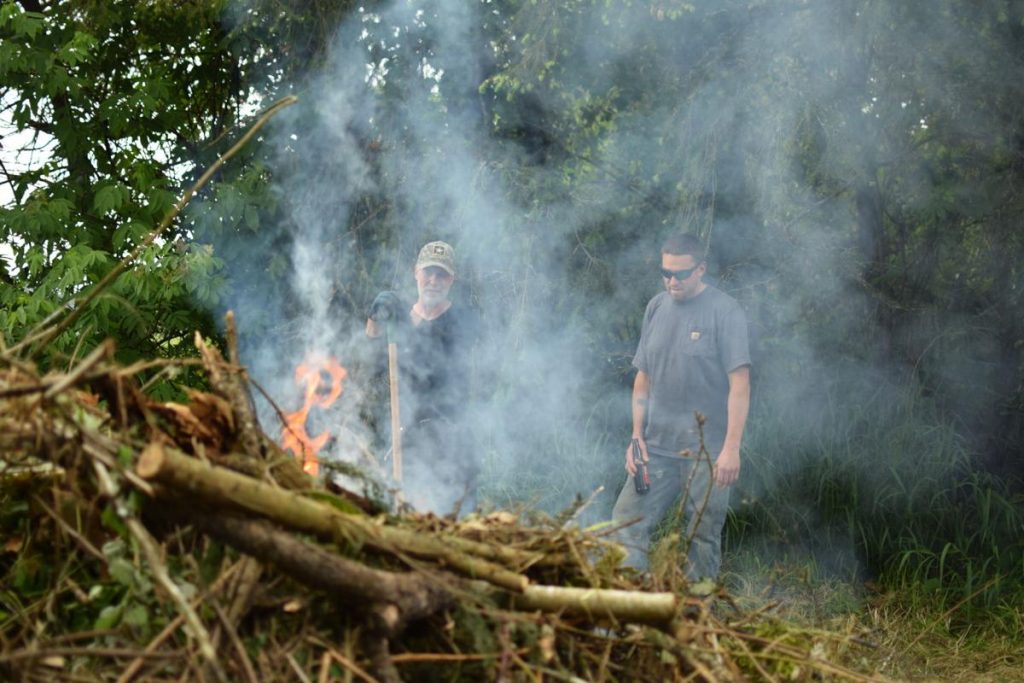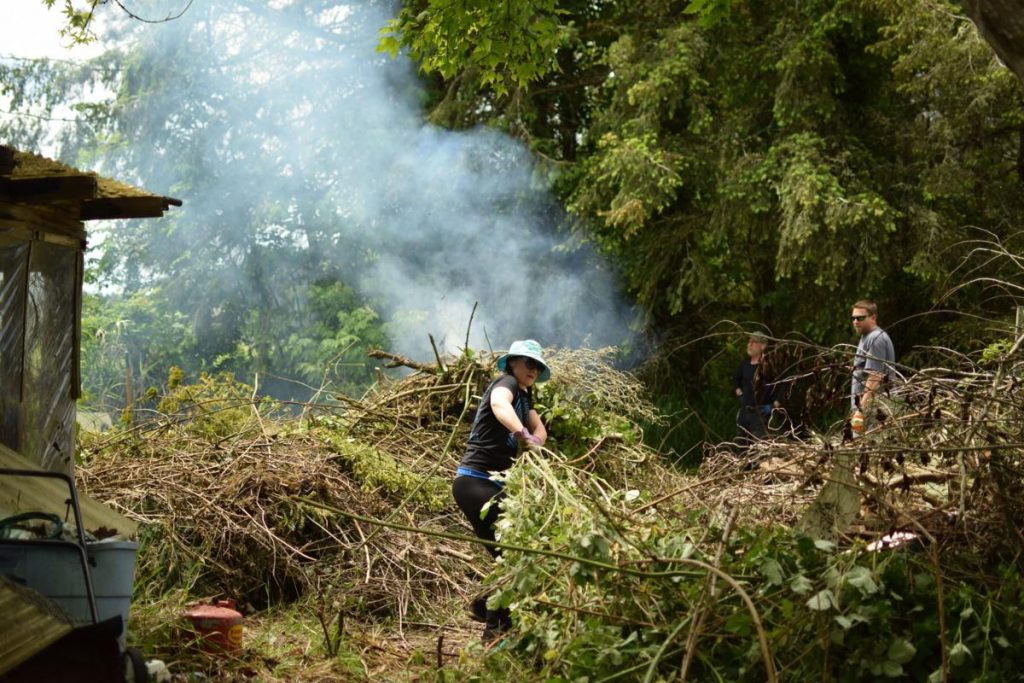COOS BAY — The wheels of government, as the old saying goes, turn slowly. Motorcycle wheels turn much faster.
At 98 years old, in the midst of a pandemic, World War II veteran Melvin Jones spends much of his time reading or speaking with his caregivers. He owns his home. He is in relatively good health. His former hobbies include gardening and running marathons.

He is in trouble.
Jones has a small home with a large yard at the edge of the water. It’s a tidy place where the rose bushes have only recently been trimmed into submission.
Until the death of Jones’ wife several years ago, the yard was orderly. Gardening was a passion of the couple and they undertook the task of keeping back the undergrowth together. A combination of grief and age made it more difficult for Jones to work in the garden.
The brambles grew around the small house. The bushes blocked the windows, making it dark.
Still, Jones is uncomplaining. A U.S. Navy veteran with a history in public education and a self-sustaining attitude, he smilingly digs into his savings each month to pay the small group of workers who make his independent life possible.
The caregivers help Jones with the basics. A former marathon runner, Jones is less mobile than he used to be, but still makes his way around the house with help. The caregivers help him with meals and exercises.
He is hard of hearing and throughout his interview, questions are asked and repeated in the shouts of his caregiver, Nancy Neeson.
Things are getting dire for Jones.
The little house is uninsured. A short time ago, an insurance inspector arrived and declared that unless Jones fixed his roof, he would lose his coverage. The roof didn’t leak, so Jones and his caregivers did not know there was a problem.
Estimates to repair the roof varied, but were all around $12,000, according to Neeson. It was more than Jones could afford.
Learning of this unknown damage was a blow. “Devastated — I felt like that was a big failure on my part,” Jones said.
According to Neeson, Jones’ savings are running low, and coming up with the funds to cover his caregivers will become impossible soon. Jones receives PERS benefits and Social Security. These cover most, but not all, of the costs to pay his caregivers. The rest, along with the little he needs for food and other expenses, come out of savings.
Neeson worries that Jones has enough left to cover just six months of care, or less. Jones says he never took advantage of benefits offered through the U.S. government, though he served nearly 75 years ago.
“I haven’t been aware of needing much help,” he said, “I’m kind of a loner. I get along by myself.”
Seeing there was a problem, Neeson and the rest of Jones’ caregivers mobilized. She connected with a veteran friend, Tim Flood, formerly of the U.S. Army, who put her in touch with Chris Berti, also formerly of the U.S. Army. They began looking into ways that Jones might take advantage of the benefits and assistance available to veterans, starting with reaching out to Operation Rebuild Hope for help with his roof.
While they wait for Jones’ pile of applications to move through a notoriously overburdened system slowed further by a global crisis, Berti leads a group of local veterans in taking on tasks a little less daunting than the bureaucracy meant to help those who served.
The local chapter of the Combat Veteran Motorcycle Association was formed in January, under the leadership of Berti. They are careful to point out that they are not a motorcycle club, but rather, an association, focused on service and fellowship with other combat veterans. As their first service project, the group volunteered to help Jones with his yard.
It’s a small group, still, with only around a dozen members. Several of the members served together in Operation Iraqi Freedom. While the group meets often to hang out and to ride their motorcycles, a pillar of the organization is performing acts of service, particularly for veterans.
With rakes, shovels, chainsaws and a little diesel, they beat back the growth around Jones’ house. The work is backbreaking and there seems to be no end to it. In Oregon, plants are tenacious, but the CVMA hasn’t been deterred.
On May 17, they burned massive piles of wood and weeds, erasing the refuse of their last trip and clearing way for more to be done. The group present that day included Berti, Flood, Larry Schuler, Ben Taylor and Jeff Thoeny. Also present were auxiliary member Aimee Taylor and Michelle Schuler, who plans to join the auxiliary soon. Lane County Chapter Commander Zachary “Slick” King, also came to town with a weed trimmer to contribute.

They come every few weeks, chopping back tall grass and overgrown shrubs. Their goal is to have the yard ready for a party.
On one of their first trips, the bushes around Jones’ windows were trimmed. He can see into his yard once again.
“That was so helpful. They worked on the lawn here and verified that somebody lived here,” Jones said.
Neeson recalls that the first day they arrived, Jones was brimming with happiness. The CVMA arrived shortly after the pandemic began, so he saluted them from behind the glass of his sliding door.

The group is jovial as they work, recalling their time overseas. They are comfortable with each other and happy to give their time to Jones, who smiles in gratitude.
In August, Jones will turn 99. At that time, the motorcycle group will have a small parade in Jones’ honor and present him with a Quilt of Valor. The party will be hosted behind the house in the space they worked so hard to clear.
The work will continue until then, both in the yard and in quieter moments working to repay a veteran for his service with the benefits he waited a lifetime to use.
Make sure you have subscribed to our Facebook page or Twitter to stay tuned!
Source: The Bandon Western World
